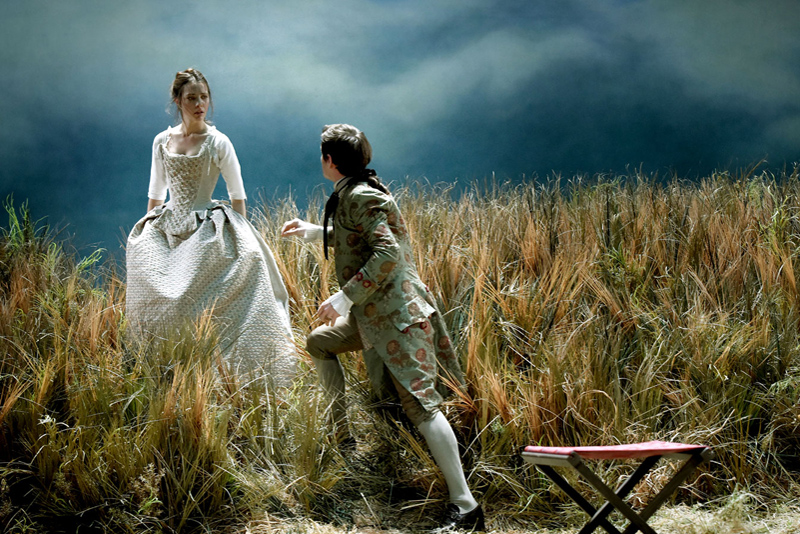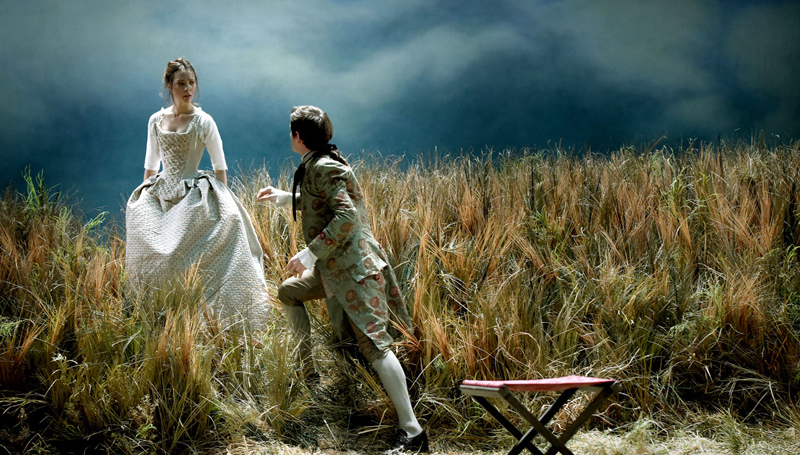“Le Petit-Maitre corrigé”: Pierre de Marivaux
David Cowan in Paris
23 January 2017
Provincial life features on the main stage of the Comédie Française in Le Petit-Maître corrigé by Pierre de Marivaux, rarely seen since 1734. It appears Marivaux had been the victim of a cabal, and with the help of an organized team of hecklers the play closed after just two nights. It has not been played since in Paris and very rarely elsewhere. It was thus a treat for Parisian theatregoers to see the play almost three hundred years later. The audience was less hostile today. Indeed, the spectators appeared more than content with this resurrected production. It is a drama worthy of its return to the Paris stage.

Loïc Corbery and Adeline d’Hermy in Le Petit-Maître corrigé .
Photo credit: Vincent Pontet.
Elegantly directed by Clement Hervieu-Léger, who is something of a specialist in directing seventeenth and eighteenth-century repertoire, Le Petit-Maître corrigé is a comedy in three acts set in the country where the young Hortense, daughter of a count, is due to marry the Parisian Rosimond, son of a Marquise and the title’s petit-maître, best translated as a “dandy? Rosimond and his mother arrive at the Count’s estate, where the marriage is to be celebrated. Hortense is worried that Rosimond likes to play games of love, chance, and money, and thus is in need of some reform before she can marry him He certainly seems little interested in her and has yet to declare his love. With her servant Marton, she decides to reform the little master and they join forces with Frontin, Rosimond’s valet, who hitherto had been a zealous imitator of his master. The affair is complicated when the Countess Dorimene, with whom Rosimond has “a small affair of the heart’,’ arrives at the country estate in an attempt to stop the wedding.
In this comedy of manners of the eighteenth century, Marivaux reverses expectations as it turns out the sophisticate is the provincial Hortense, outdoing the smart Parisians Rosimond and Dorimene. The climactic scene takes place in a clearing in a rural field where, much to the locals’ delight, the smart Parisians keep tripping over the grass and pathways — though the stage design makes it appear to be more like the grass and sand of a beach scene. Either way, the scenery is visually pleasing, accentuated by a series of pale and marine skies on a changing canvas backdrop. Music and lighting add to the cinematic effect.

Loïc Corbery and Claire de la Rüe du Can in Le Petit-Maître corrigé .
Photo credit: Vincent Pontet.
At various points the sexualisation of the acting obscures the subtly of the language, which is a shame but inevitable in the times in which we live. Hortense and Marton are feminists before their time, nearly three hundred years before #MeToobecame a thing, and Adeline d’Hermy is excellent as the feisty no-nonsense servant. New to the Comédie Française, Claire de la Rue du Can plays Hortense with a charm and playfulness that suggests she will be with the troupe for many years to come.
Loic Corbery plays Rosimond with great energy – and with an idiotic laugh that brings to mind the Amadeus Mozart character in Milos Forman‘s film Amadeus .Yet he brings off the dandy persona with the necessary panache, but also the vulnerability that we know will slide him towards his ultimate defeat at the hands of Hortense. Florence Viala is wonderful as the jealous, brash, but ultimately thwarted Dorimene. The older generation in the play are something of a classy treat too, with Didier Sandre playing the Count and father of Hortense, and, Dominique Blanc playing the Marquise and mother of Rosimond. They worked together on the 1990s French TV period drama L’Alllée du Roi.
Le Petit-Maitre corrigé finally was staged for a third night and beyond. It deserves to become a staple in the classic French repertory.









